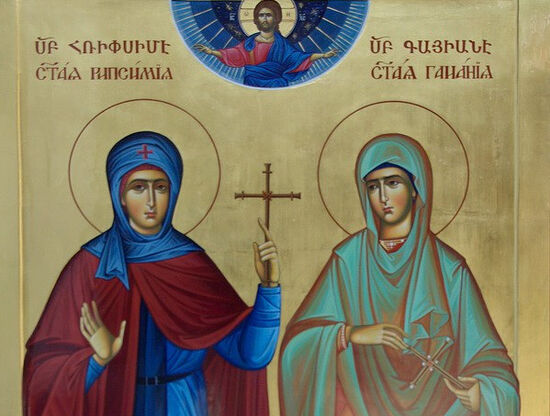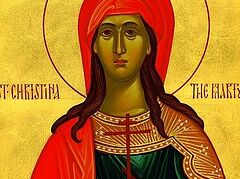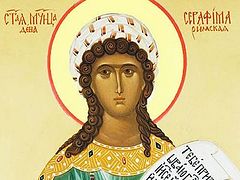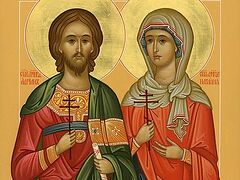Saint Ripsimia (Ριψιμία or Ριψίμη) suffered martyrdom in the year 292, during the reign of Diocletian (284-304). She was very beautiful in terms of her outward appearance, and modest in her character. In those days, Diocletian sent men throughout the Empire to find a maiden fairer than all others for him to marry. They found Saint Ripsimia, who had consecrated her virginity to Christ, and was living in a community of women in Asia Minor, of which Saint Gaianḗ was the Superior. The messengers had a portrait of Ripsimia made and sent it to Diocletian. The Emperor was captivated by her beauty, and he sent her a letter, asking her to be his wife. Ripsimia, who had Christ as her heavenly Bridegroom, did not want to marry anyone else. Therefore, the nuns decided to take refuge in Armenia. On the way, they endured hunger, thirst, and many other trials.
They settled in a vineyard on the slopes of Mount Ararat, and the stronger women would go into the city to work for people in order to earn money to purchase food and other necessities. All the women were willing to endure exile, and to bear every burden and sorrow for the sake of purity.
When Diocletian was informed that Ripsimia had fled to Armenia, he wrote to his friend King Tiridates saying, "If you find her, send her to me, or, if you wish, marry her yourself."
Tiridates sent his men to search for Ripsimia, and when they found her they surrounded the area so that she could not escape. When he learned how beautiful she was, Tiridates sent her presents and raiment worthy of a queen, so that she might appear before him in a suitable fashion. Ripsimia, however, acting in accordance with the instructions of Saint Gaianḗ, who had raised her from childhood, rejected these gifts and refused to go to the King. Saint Gaianḗ told the messengers that these virgins were already betrothed to Christ, and that it was impossible for them to enter into an earthly marriage.
When the messengers told Tiridates what had happened, he became very angry. He sent one of his princes and an army of soldiers to kill all the virgins and to bring Ripsimia to him by force. When she saw the soldiers approach the virgins with drawn swords, Saint Ripsimia told the Prince, "Take me to your King, but do not harm these virgins."
Saint Ripsimia was taken to the royal bedchamber, weeping and praying that God would preserve her virginity. Recalling how He had helped His servants in the past, how He saved Israel from Pharoah's hands, keeping Jonah in the belly of the whale for three days, and how He protected the Three Holy Youths in the fiery furnace, she believed that He would also rescue her from Tiridates.
When the King entered the chamber he attempted to rape her, but with God's help she became stronger than Tiridates, and he was not able to harm her. Leaving the chamber, the King commanded that Saint Gaianḗ be brought to him, since he had discovered that she had raised Ripsimia. The King told her to persuade Ripsimia to submit to him, but when the Eldress spoke to her she counseled her to preserve her virginity, which she had dedicated to Christ, and to remember the crown which her Bridegroom had prepared for her. Finally, she said that if the King should put her to death, she would enjoy even greater favor from Christ.
Seeing that he had accomplished nothing, even though he had struggled with Ripsimia for a long time, the King began to tremble and roll around on the floor. That night, Saint Ripsimia escaped and fled from the city. She found the sisters and told them how she had remained undefiled.
The next morning some soldiers found Ripsimia and arranged a cruel death for her. First they cut out her tongue, stripped her, tied her hands and feet to columns, and burned her with candles. Then they tore her stomach open with a sharp stone, so that her entrails fell out. Finally, they plucked her eyes out and cut off her members. Having completed her contest, she departed to Christ, the bestower of crowns.
The Eldress Gaianḗ and two other virgins suffered even greater torments. The pagans drilled through their legs, suspended them upside down, and skinned them alive. Cutting their necks from behind, they pulled their tongues out and cut them off. Next, their stomachs were cut with sharp stones so that their entrails fell to the ground. Finally, they were beheaded.
Thirty-two other Virgin Martyrs (some sources say there were thirty-five) suffered horrible tortures, and died by the sword, then their bodies were thrown to the wild animals.
In addition to these holy women, seventy men who were hiding in that area also suffered martyrdom.
Troparion — Tone 4
Your holy martyrs, O Lord, / through their sufferings have received incorruptible crowns from You, our God. / For having Your strength, they laid low their adversaries, / and shattered the powerless boldness of demons. / Through their intercessions, save our souls!




